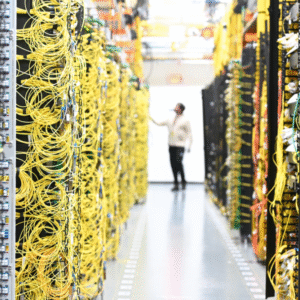In a bold step forward, Google has unveiled its latest innovation: a new AI accelerator chip codenamed Ironwood. This move signals Google’s commitment to staying at the forefront of artificial intelligence (AI) development, joining other tech giants in a heated race to create specialized hardware that powers the next generation of AI applications. With Ironwood, Google is doubling down on its mission to make AI faster, smarter, and more efficient—here’s what you need to know about this exciting development.

Why Ironwood Matters
AI is transforming everything from how we search the internet to how businesses predict trends. But running complex AI models requires massive computing power, and that’s where specialized chips like Ironwood come in. Unlike general-purpose processors, AI accelerator chips are designed to handle the unique demands of AI tasks, such as crunching huge datasets or training machine learning models. By introducing Ironwood, Google aims to supercharge its AI capabilities, ensuring its tools and services—like Google Search, Translate, and Cloud—stay ahead of the curve.
Ironwood is part of a broader trend. Companies like NVIDIA, AMD, and Intel have been pouring resources into AI hardware, and Google’s no stranger to this game. Its earlier Tensor Processing Units (TPUs) already power many of its AI-driven services. Ironwood, however, promises to take things to the next level, though Google has kept the technical details under wraps for now. What we do know is that this chip is built to optimize performance and efficiency, which could mean faster AI processing with less energy consumption—a win for both Google and the planet.
The Bigger Picture
The launch of Ironwood isn’t just about one chip; it’s a sign of where the tech industry is headed. As AI becomes more central to our lives, the demand for tailored hardware is skyrocketing. Whether it’s self-driving cars, virtual assistants, or medical diagnostics, AI needs chips that can keep up. Google’s competitors are also in on the action—Apple has its Neural Engine, and Amazon has its Trainium chips. This race isn’t just about bragging rights; it’s about who can deliver the most powerful, cost-effective solutions to businesses and consumers.
For Google, Ironwood could strengthen its position in the cloud computing market, where it competes with Amazon Web Services and Microsoft Azure. By offering cutting-edge AI hardware, Google Cloud could attract more companies looking to build AI-powered apps or analyze massive datasets. Plus, with growing concerns about energy use in AI, a chip that’s more efficient could give Google an edge in sustainability—a hot topic in tech today.
What’s Next?
While Google hasn’t spilled all the beans about Ironwood yet, the tech world is buzzing with anticipation. Will it outperform its predecessors? Could it reshape how Google’s AI services work? For now, we’ll have to wait for more details, but one thing’s clear: Google’s not slowing down. Ironwood is a reminder that the AI revolution is as much about hardware as it is about software, and Google’s ready to play ball.
As the tech giants keep pushing the boundaries, we can expect more breakthroughs that make AI faster, smarter, and more accessible. For everyday users, that could mean better apps, more accurate recommendations, and maybe even cooler gadgets down the road. For now, Ironwood is a glimpse into the future—one where AI and hardware go hand in hand to shape the world we live in.
Reference Articles:
- TechCrunch – Google’s AI Hardware Push Continues with Ironwood Chip
- The Verge – Inside Google’s Plan to Dominate AI with New Chips
- ZDNet – Why Google’s Ironwood Could Shake Up the AI Market










3 Comments